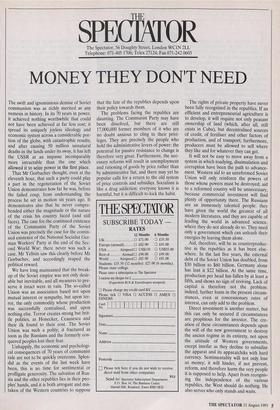SPECTAT THE OR
The Spectator, 56 Doughty Street, London WC1N 2LL Telephone: 071-405 1706; Telex 27124; Fax 071-242 0603
MONEY THEY DON'T NEED
The swift and ignominious demise of Soviet communism was as richly merited as any nemesis in history. In its 70 years in power, it achieved nothing worthwhile that could not have been achieved at far less cost; it spread its uniquely joyless ideology and economic system across a considerable por- tion of the globe, with catastrophic results; and after causing 50 million unnatural deaths in the lands under its sway, it has left the USSR at an impasse incomparably more intractable than the one which allowed it to seize power in the first place.
That Mr Gorbachev thought, even at the eleventh hour, that such a party could play a part in the regeneration of the Soviet Union demonstrates how far he was, before the failed coup, from understanding the process he set in motion six years ago. It demonstrates also that he never compre- hended either the magnitude or the nature of the crisis his country faced (and still faces). The case for, the continued existence of the Communist Party of the Soviet Union was precisely the case for the contin- ued existence of the National Socialist Ger- man Workers' Party at the end of the Sec- ond World War: there never was such a case. Mr Yeltsin saw this clearly before Mr Gorbachev, and accordingly reaped the political reward.
We have long maintained that the break- up of the Soviet empire was not only desir- able but inevitable, and all measures to pre- serve it intact were in vain. The so-called Union was an association based not upon mutual interest or sympathy, but upon ter- ror, the only commodity whose production was successfully centralised, and upon nothing else. Terror creates strong but brit- tle polities, as Honecker, Ceausescu and their ilk found to their cost. The Soviet Union was such a polity; it fractured as soon as the Russians and the formerly con- quered peoples lost their fear. Unhappily, the economic and psychologi- cal consequences of 70 years of communist rule are not to, be quickly overcome. Splen- did as the events of the last week have been, this is no time for sentimental or profligate generosity. The salvation of Rus- sia and the other republics lies in their peo- ples' hands, and it is both arrogant and mis- taken of the Western countries to suppose that the fate of the republics depends upon their policy towards them.
The problems facing the republics are daunting. The Communist Party may have been dissolved, but there are still 17,000,000 former members of it who are no doubt anxious to cling to their privi- leges. They are precisely the people who hold the administrative levers of power: the potential for passive resistance to change is therefore very great. Furthermore, the nec- essary reforms will result in unemployment and rationing of goods by price rather than by administrative fiat, and there may yet be popular calls for a return to the old system of price controls and subsidies. Socialism is like a drug addiction: everyone knows it is harmful, but it is difficult to kick the habit. The rights of private property have never been fully recognised in the republics. If an efficient and entrepreneurial agriculture is to develop, it will require not only peasant ownership of land (which, after all, still exists in Cuba), but decentralised sources of credit, of fertiliser and other factors of production, and of transport; furthermore, producers must be allowed to sell where they like and for whatever they can get.
It will not be easy to move away from a system in which toadying, dissimulation and corruption have been the path to advance- ment. Western aid to an unreformed Soviet Union will only reinforce the powers of those whose powers must be destroyed; aid to a reformed country will be unnecessary, because commercial investment will find plenty of opportunity there. The Russians are an immensely talented people: they have given the world the greatest of all modern literatures, and they are capable of leading the world in advanced science, where they do not already do so. They need only a government which can unleash their energies by leaving them alone.
Aid, therefore, will be as counterproduc- tive in the republics as it has been else- where. In the last five years, the external debt of the Soviet Union has doubled, from $30 billion to $60 billion. Germany alone has lent it $22 billion. At the same time, production per head has fallen by at least a fifth, and shows no sign of reviving. Lack of capital is therefore not the problem: indeed, further loans in the present circum- stances, even at concessionary rates of interest, can only add to the problem.
Direct investment is another matter, but this can only be secured if circumstances are propitious for the investor. The cre- ation of these circumstances depends upon the will of the new government to destroy the ancien regime in its entirety, not upon the attitude of Western governments, except insofar as they decline to subsidise the apparat and its apparatchiks with hard currency. Sentimentality will not only lose us money; it will hinder, if not prevent, reform, and therefore harm the very people it is supposed to help. Apart from recognis- ing the independence of the various republics, the West should do nothing. He also serves who only stands and waits.










































 Previous page
Previous page